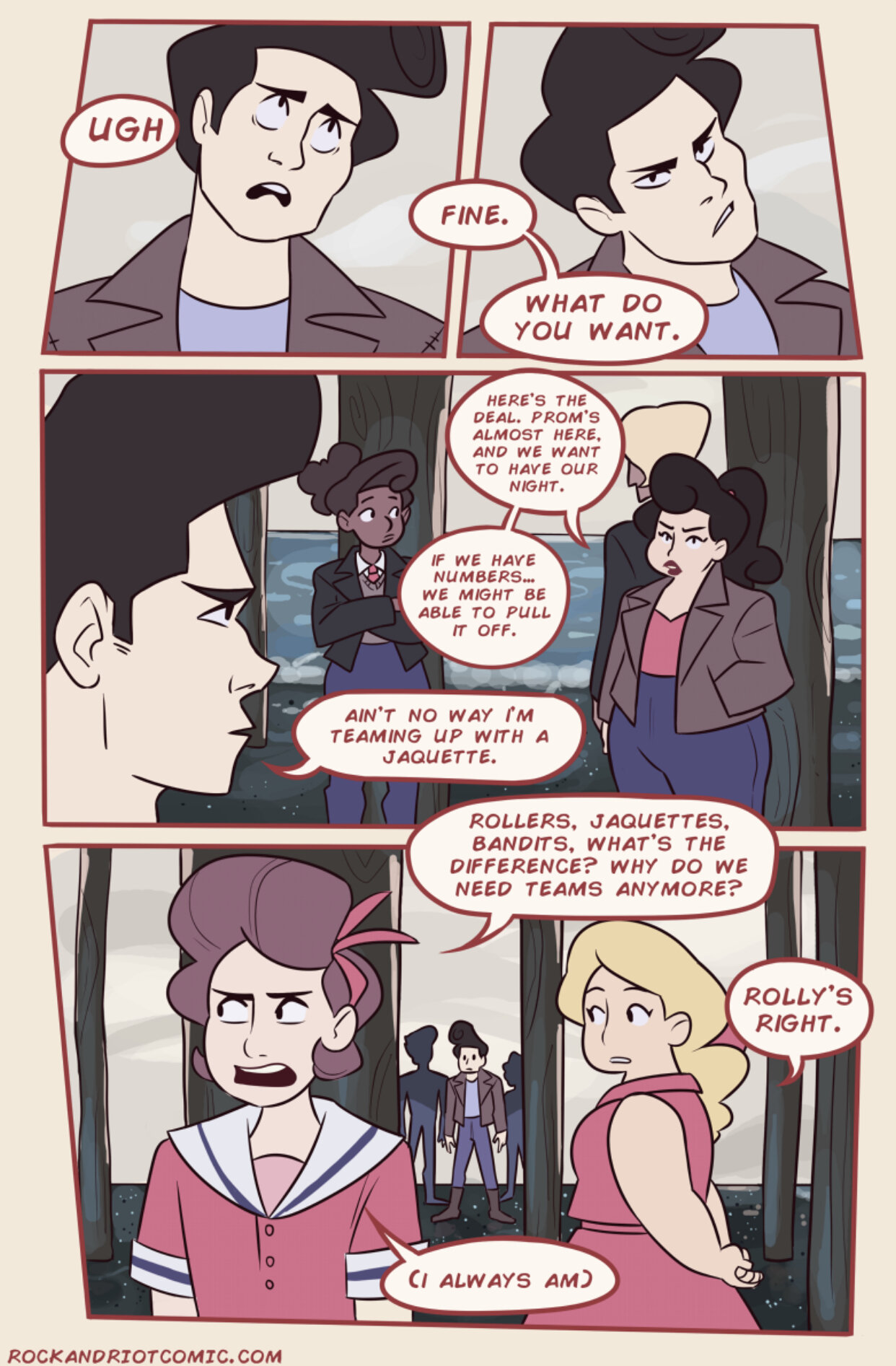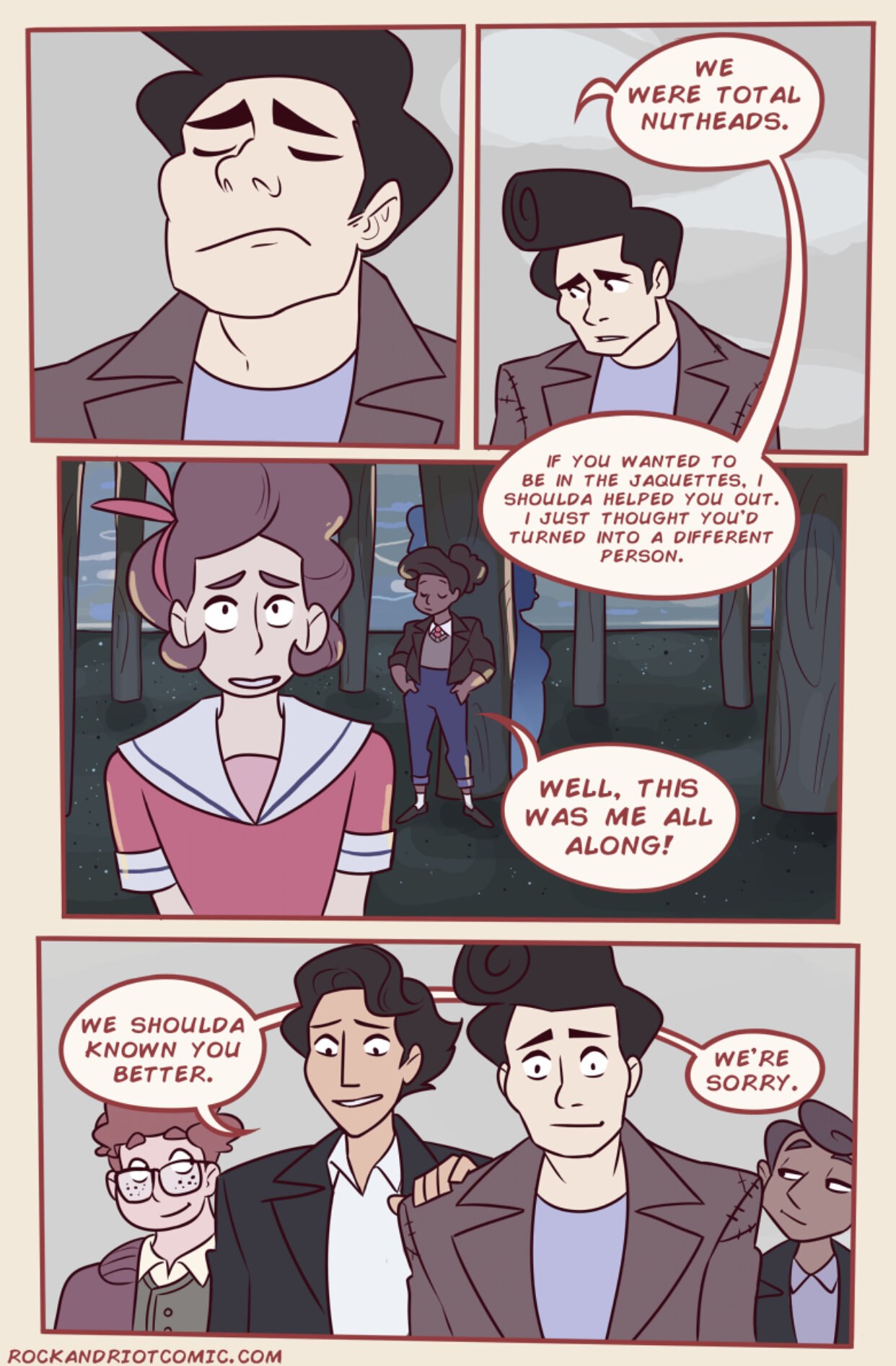Rock and Riot, written by Chelsey Furedi, is the story of two rival gangs: the Rollers and the Jaquettes. Feuding ever since they were kids, tensions started rising even higher after Rolly decided to leave the rowdy, narrow-minded Rollers for the more welcoming Jaquettes after she transitioned. Shortly after, Rolly draws the attention of Ace, founder of the Bandits, but their relationship isn’t the only one that’s been hiding in the shadows. It turns out the Rollers and the Jaquettes have a lot more in common than they thought.
Why set a love story with queer characters in an era that was intolerant of them?
As discussed before on this blog — and by countless others in other media — representation of queer characters has been advancing slowly but surely. While the medium and target audience of these stories are major factors behind the possibility of actually featuring sexuality diverse characters, an overall popular genre to explore queer people and relationships continues to be slice-of-life since the contemporary, down-to-earth scenarios resonate with many and their own experiences. In a similar yet more appealing genre for some, we have the period piece: a popular genre featuring realistic scenarios set in a past era that ultimately prove that people have always been people. Where do queer characters fit in these stories?
Credit: Chelsey Furedi
A five-panel page.
First panel: A close-up of Frankie rolling his eyes, completely annoyed.
Frankie: UGH
Second panel: A close-up of Frankie, tilting his head, looking straight at the Jaquettes.
Frankie: Fine. What do you want.
Third panel: On the left side of the panel, a profiled close-up Frankie as he talks to the Debbie. Connie and Triss are standing close to Debbie, avoiding eye contact with Frankie.
Debbie: Here’s the deal. Prom’s almost here, and we want to have our night. If we have numbers… We might be able to pull it off.
Frankie: Ain’t no way I’m teaming up with a Jaquette.
Fourth panel: In the foreground, Rolly has her back to the Rollers, behind a wooden beam, looking exasperated with the conversation. Carla is nearby, arms behind her, looking calm. In the background, Frankie is surprised to hear Rolly’s voice.
Rolly: Rollers, Jaquettes, Bandits, what’s the difference? Why do we need teams anymore?
Carla: Rolly’s right.
Rolly: (I always am)
One of the main drawing points of the period piece is its emphasis on hyper realism. This means that not only must the characters, setting, and drama be grounded in realism, but it must depict the truest of realism. The darkness and grit of the times must be heavily showcased to distance the text from sterilized history lessons. At the same time, however, the deeply-rooted ideas that people have of the past must not be completely disturbed because, to the uneducated audience at large, certain aspects of the past might be perceived as “unrealistic,” a conceit on the creator’s part, if you will. This reaction is easy to see within the cries of “forced representation”: the alleged imposition of sexually and ethnically diverse characters in media. Representation is never forced; it is acknowledged and doing so, just like everything else we do, is inherently political. Including queer characters in not only contemporary settings, but also in historical settings normalizes the fact that queer people have always existed.
Credit: Chelsey Furedi
A five-panel page.
First panel: A close-up of Frankie as her breathes in deep
Second panel: Frankie, with his head hanging, looks sad and vulnerable
Frankie: We were total nutheads. If you wanted to be in the Jaquettes, I shoulda helped you out. I just thought you’d turned into a different person
Third panel: In the foreground, Rolly is cautiously looking up at Frankie. In the background, Connie and the other Jaquette’s are leaning against a wooden beam
Rolly: Well, this was me all along
Fourth panel: Frankie flanked by the rest of the Rollers. Gene and Edd are looking at Clyde and Frankie as they offer their apologies to Rolly
Clyde: We shoulda known you better. We’re sorry.
Rock and Riot is an great example of this reclaiming and queering of history. The 1950s are often glorified in the United States as a kind of golden era: World War II was over; the economy was booming; suburban development was thriving; and most importantly, the aesthetic was on point. The cars, the music, the clothes… It was all so carefree, remembered which such fondness especially after the doom and gloom of the 1980s set in. Conservatives wax poetic about the 50s, but for those that couldn’t conform to the narrow mainstream, the 50s were a time of fear. In the eyes of the public, marginalized groups didn’t exist or had no place in society, which in turn reflects in the media of the time and about it: heteronormative and white-washed. While some may cry historical inaccuracy and forced representation at a story like Rock and Riot, the reality is that, beyond the conceit that these characters lived in relative safety, queer people existed then, with all the emotion, need for companionship, and excellent taste as they do now. We need to see more stories like this.

